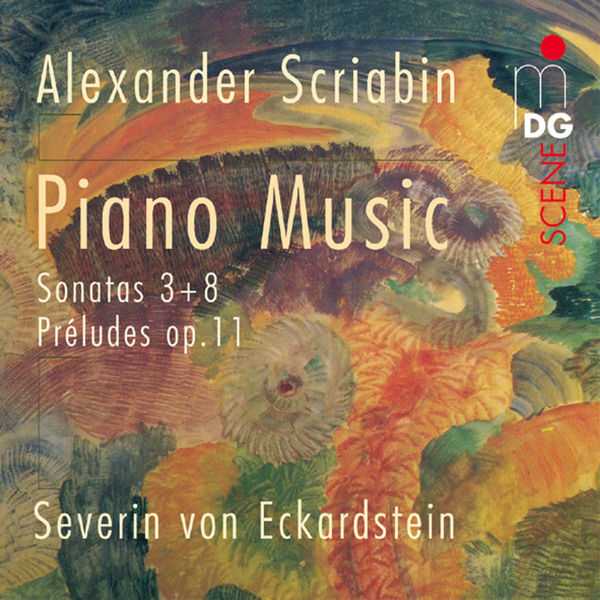
Composer: Alexander Scriabin
Performer: Severin von Eckardstein
Format: FLAC (tracks)
Label: MD&G
Release: 2005
Size: 179 MB
Recovery: +3%
Scan: cover
24 Preludes, Op. 11
01. I. Vivace in C Major
02. II. Allegretto in A Minor
03. III. Vivo in G Major
04. IV. Lento in E Minor
05. V. Andante cantabile in D Major
06. VI. Allegro Si Minor
07. VII. Allegro Assai in A Major
08. VIII. Allegro Agitato in F-Sharp Minor
09. IX. Andantino in E Major
10. X. Andante in C-Sharp Minor
11. XI. Allegro Assai in B Major
12. XII. Andante in G-Sharp Minor
13. XIII. Lento in G-Flat Major
14. XIV. Presto in E-Flat Minor
15. XV. Lento in D-Flat Major
16. XVI. Misterioso B-Flat Minor
17. XVII. Allegretto in A-Flat Major
18. XVIII. Allegro Agitato in F Minor
19. XIX. Affettuoso in E-Flat Major
20. XX. Appassionato in C Minor
21. XXI. Andante in B-Flat Major
22. XXII. Lento in G Minor
23. XXIII. Vivo in F Major
24. XXIV. Presto in D Minor
Sonata No. 8, Op. 66
25. Lento – Allegro agitato
Sonata No. 3 in F Sharp Minor, Op. 23
26. I. Drammatico
27. II. Allegretto
28. III. Andante
29. IV. Presto con fuoco
In 2000, when Severin von Eckardstein won the third place prize at the Leeds International competition, he was also awarded a prize for his interpretation of twentieth century works. This is his second disc for MDG, and like the first, it takes advantage of his knowledge and interpretation of “modern” piano music, even though Scriabin’s Preludes and the Sonata No. 3 pre-date the twentieth century. Eckardstein plays these works very facilely, moving smoothly between the most intimate pianissimo to the broadest fortissimo, and with a worry-free handling of the technical challenges. He takes full advantage of the piano’s different sounds and tones here and uses a well-judged amount of pedal, picked up well by the recording, that adds to the abstract nature of the music. He leaves no doubt that Scriabin wrote these for the piano and no other instrument or ensemble. But Eckardstein is not just showing off his ability to play difficult works with ease. There is a large measure of maturity in his playing as well. Each of the preludes is distinct in character, just as Chopin’s are, and Eckardstein recognizes that each one is different, has its own shape, shades, and temperament. He appreciates the more elusively named emotions that go with the shifting harmonies of the Sonata No. 8, and relishes the happier thoughts of the Sonata No. 3. His program notes included in the booklet reflect his understanding of both the expressive and technical sides of Scriabin’s music. There is some room for growth in Eckardstein’s Scriabin, but it confirms a potential that has been recognized in competition.